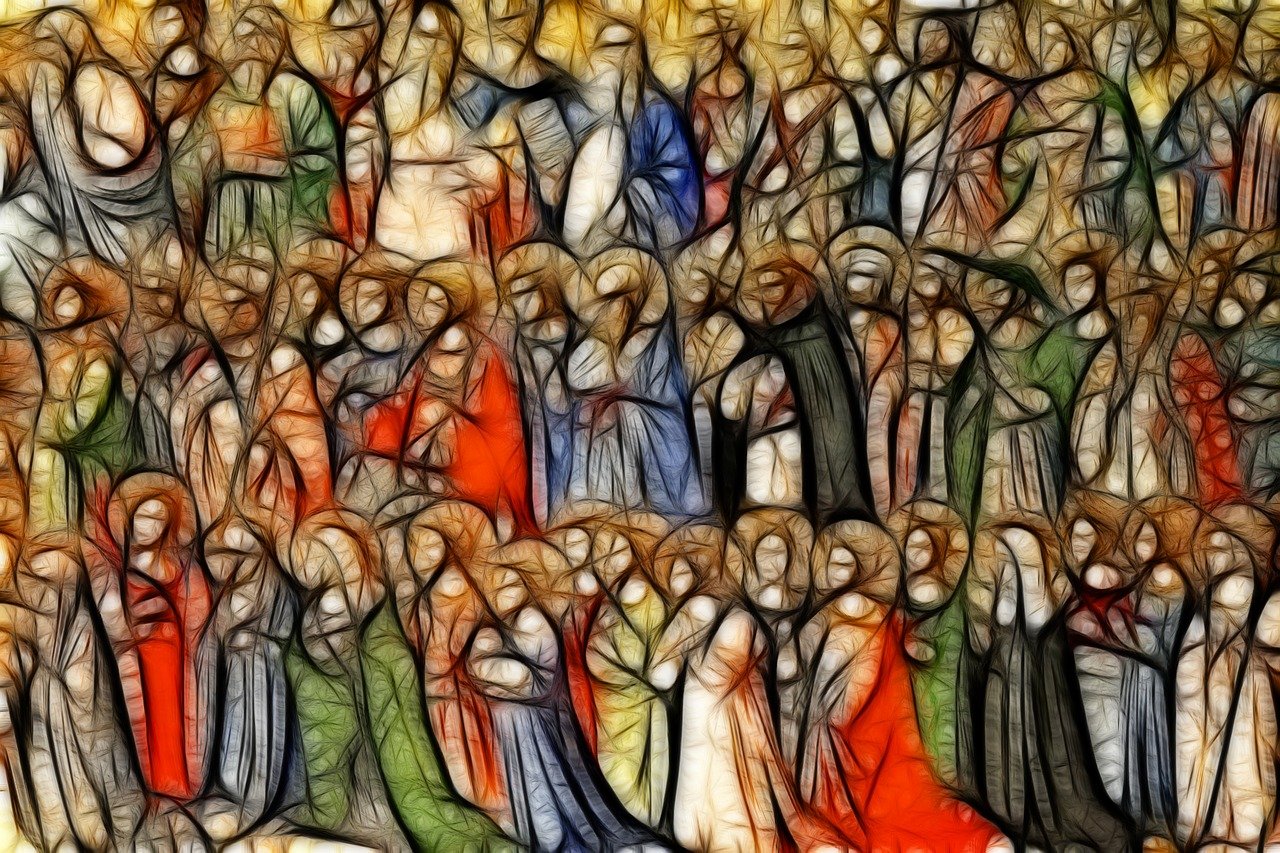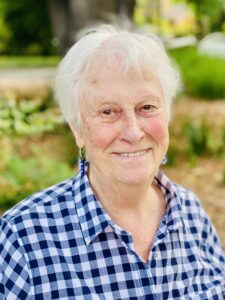- All
- Wisdom
- We Stand on Their Shoulders
- Vocation
- Uncategorized
- Stories Seldom Heard
- Spirituality
- Social Justice
- Prayer
- Peace
- Oneness
- Love
- Letting Go
- Lent
- Joy
- Inspirational Images
- Hope / Healing
- Holy Week
- Gratefulness
- God's Presence
- General News Stories
- Forgiveness
- Finding God
- Faith
- Easter
- Dominican Saints
- Discipleship
- Courage
- Christmas
- Catholic Sisters Week
- Care of the Earth
- Blessing
- Beauty
- Advent
- #justiceOPportunity
We Celebrate All Saints
Sr. Patricia Bruno, OP

November 2024
304th Edition
 Halloween (the Eve of All the Holy Ones) and All Saints Day are here. This morning I was invited to one of our neighbor’s homes to see their Day of the Dead altar. The altar was filled with fruits, candies, vegetables, flowers, candles, statues and, of course, photographs of their deceased loved ones. Tomorrow night, November 2nd, relatives and friends will gather to tell stories and to remember their loved ones who have died. What an ancient, comforting, and profound custom.
Halloween (the Eve of All the Holy Ones) and All Saints Day are here. This morning I was invited to one of our neighbor’s homes to see their Day of the Dead altar. The altar was filled with fruits, candies, vegetables, flowers, candles, statues and, of course, photographs of their deceased loved ones. Tomorrow night, November 2nd, relatives and friends will gather to tell stories and to remember their loved ones who have died. What an ancient, comforting, and profound custom.
These two feasts, All Saints Day and the Day of the Dead, are big celebrations. As children, many of us celebrated Halloween by dressing up as our favorite saints, heroes, or heroines. As we have gotten older the feast of All Saints Day also reminds us of the original meaning and use of the word “saint.” In the early church saints were not a small select group of people.
Paul, in his Letter to the Hebrews, speaks of “the cloud of witnesses” (Heb 10:1). In the Apostles Creed, we speak of “the communion of saints” which refers to all of us: those who have died and those who are still alive. It is a great throng of intergenerational witnesses. It involves people of every race, nation, and century. Some of the saints are/were prophets, others visionaries, contemplatives, soldiers, and pacifists to name a few. Some of them are individually named in scripture such as Sarah and Abraham, Rachel and Jacob, John the Baptist, Mary Magdalene, Paul, Lydia, and many more. In the early church Paul addresses his letters “to the saints” in Ephesus, and “to all the saints” in Philippi.” The Bible is filled with numerous stories of saints. They are not perfect people, but they, like us, strive to be friends of God.
The feast of All Saints, however, is more than just a celebration of our lives. It is more accurately a celebration of God’s creativity and grace: a celebration of what God has done for us. God has invited each of us, the obscure and timid, as well as the acknowledged and remembered ones, to be part of this feast of all saints. Contemplatives and activists, those who form public policies, as well as those who have lived private pious lives encouraging others to follow God’s ways, are invited to join in the feast. As you can see, this is not a small, well-defined group of people. St. Augustine, in one of his sermons, says that the saints have widened the narrow road by their passage. They, by trampling over uncharted ground, have made the road accessible and broad enough for innumerable God-seekers to find their way.
In this great company, there is no ranking in the order of good deeds. The image that Jesus uses, the first being last and the last being first, evokes a circle dance rather than a line of people or even a parade. There seems to be no beginning or ending to this ever-increasing crowd. If we were to scan the “witnesses,” many of the people would not be known to us. But there would be others whom we would recognize: public figures who have made a difference in our world
As we think about the God-seekers who have gone before us, we would know many of them by name. These dear ones have birthed us, physically and/or spiritually. They have nourished our dreams and supported our visions. They are our colleagues, family members, and intimate friends who continually shape our lives through their conversations, questions, and affirmations. They are the ones whom we know by name and whose spirits still enliven our hearts. All of these people are part of the crowd of witnesses who gather and sing God’s praises on this feast of All Saints.
Recently many more have joined the cloud of witnesses. Gustavo Gutiérrez, O.P. (8 June 1928 – 22 October 2024) was a Peruvian philosopher, Catholic theologian, and Dominican priest who was one of the founders of Liberation Theology in Latin America. Alexei Navalny was a Russian opposition leader, lawyer, anti-corruption activist and political prisoner. He was recognized by Amnesty International as a prisoner of conscience. He was imprisoned, tortured, and died on February 16, 2024 (age 47 years). Sister Dorothy Stang was assassinated in the Brazilian Amazon in 2005 by hitmen hired by ranchers and loggers who saw both plants and people as obstacles to their power and wealth. Berta Cáceres (d. 2016) rallied the indigenous Lenca people of Honduras and waged a grassroots campaign that successfully halted the Agua Zarca Dam. And there are so many more both named and unknown whose stories hold the bitter-sweet truth of martyrdom.
This is the day to celebrate our connections: the communion of saints. The Preface of the Mass for the feast of All Saints prays: “Around your throne the saints, our brothers and sisters, sing your praises forever. Their glory fills us with joy, and their communion with us…gives us inspiration and strength as we hasten on our pilgrimage of faith, eager to meet them. With their great company and all the angels, we praise your glory as we cry out with one voice. Holy, holy, holy….”
Traditionally, the repetition of the word “holy” is viewed as a superlative way of praising God. Instead of saying “most holy or holiest,” the Hebrew language repeats the word three times for emphasis, “Holy, holy, holy.” But on this day the chant also takes on another nuance. It is as though the word “Holy” said in one voice by the “cloud of witnesses” echoes throughout the ages. In one voice, “Holy” bounces off the hillsides and mountains, “holy” sinks into the valleys and the seas, “holy” seeps through the crevasses of “time past” and seals them together with “time present” and “time to come.” “Holy, holy, holy,” repeatedly chanted by the known and anonymous friends of God echoes God’s praise.
On this day too, as we enter into the circle dance once again, we look with awe at those whom we join. It is a feast of solidarity that does not overlook past and present suffering, rather it puts them in the framework of God’s divine compassion and wisdom. It is a day in which we view creation and all of life with the eye of an artist who envisions a timeless heaven and earth joined together as one. It is a day we speak as a poet who reminds us that the grandeur of God is working itself out in the mystery of time. This is a day in which we join a mysterious choir that chants God’s glory as its echo of hope resounds throughout the heavens and the earth.
This is a day for memories that tell us who we are and where we have been. Memories connect us with the past and remind us of our strengths and weaknesses. They confirm our commitments and help direct our future. By celebrating the feast of All Saints we recall our ancestors’ commitments and foibles, as well as God’s power in ages past and our day. God’s grace permeates all creation. Amid struggles and tears, joys and achievements, God’s mercy and compassion heal us and bring us to wholeness as they did for those who have gone before us. This is a day that celebrates the working of grace in our lives. By remembering what God has done in the past, we who are part of the communion of saints now witness to God’s promises being fulfilled in our lives too.
There is still much to be done. God’s work of creation is still incomplete. We do not know where God is leading us, but we do know that God has invited us into the work of creation. What we do and do not do, have strong ramifications for God’s world! Each day is a gift that God offers us. Let us use it wisely.
Perhaps it might be helpful to ask ourselves a couple of questions that will heighten our awareness of the gifts we have received. How can we become more aware of our own participation in the “communion of saints,” and draw strength from that reality? How do we experience and/or visualize our place among the friends of God?
Eileen Mize, Director of Communications
Read More